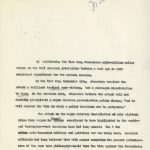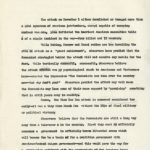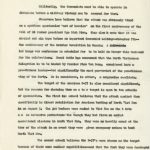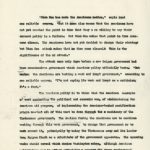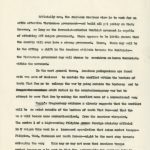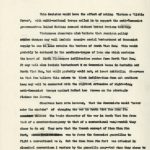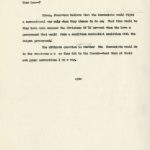1964, November 5, “Multi-Million Dollar Attack”
deepe
bien hoa–1 Nov 5.
BI SAIGON–The Vit Viet Cong Communists multi-million dollar attack on the B-57 American jet-fighter bombers a week ago is conc considered significant for two reason. reasons.
On the Viet Cong Communist side, observers consider the attack a brilliant tactical succ victory, but a strategic miscalculation by them. On the American side, observers believe the attack will not directly precipitate a major American post-election policy change, “but it will shorten the time in which a policy decisions can be postponed.”
The attack on the major military installation el only eighteen miles from Saigon is (More) considered to have highlighted to the world–and Washington–what Americans here had long sensed: Tha t the militx anti-Communist military and political war was being lost. American officials had long believed that with proper execution the present policies–more of the same type philosophy–could turn the tide against the Communists.
But Bien Hoa appears to have shortened the time period which this philosophy could be advocated at either the Saigon or Washington level.
The questions raised by the Bien Hoa attack is are: what policy change might appear–if any–and would it be soon enough. (More)
deepe
bien hoa–2
The attack on November 1 either demolished or damaged more than a quad squadron of American jet-bombers, carryi capable of carrying nuclear weapons, plusinflicted the heaviest American casualties tolls i of a single incident in the war–four killed and 72 wounded.
While Peking, Moscow and Hanoi radios are hea heralding the atta ck attack as a “great achievement”, observers here predict that the Communist strategist behind the attack will not receive any medals for the feat. While tactically sucessful successful, observers believe the attack created –a py psychological shock to Americans and Vietnamese here–created the impression “The Communists can take over the country now–but why don’t you?” Observers predict the effect may well mean the Communists may lose some of their mass support by “promising” something that is still years away in reality.
Hence, the Bien Hao Hoa attack is consered considered too early–it was a tiny Dien Bienk Phu without the hope of final military or political victory.
Observers believe that the Communists are sill a long way away from a take-over i in the country. First they must fi officially announce a government in officially known liberated areas which will become the ba s basis of for a coalition government with American-backed Saigon government–and this would pave the way for a neutralist settlement with the prerequiste of for American troop withdrawal. Milita rily, the Communists must be able to operate in divisions before a military victory ca
deepe
bien hoa–3
Militarily, the Communists must be able to operate in divisions before a military victory can be assured for them.
Observers here believe that the attack was obviously timed as a spectacu spectacular “act of heroism” on the first anniversary of the fall of Di former presidentNgo Dinh Diem, they also k note that it was carried out six days before an important Communist holiday–November 7th–the anniversary of the October Revolution in Russia. A fall confre lat large von conference is scheduled for to be held in Moscow this week-end for the celebrations. Hanoi Radio has announced that the North Vietnamese delegation is to be headed by Premier Pham Van Dong, considered here a pro-Chinese leader–but significantly the most pro-Soviet of the pro-Chinese wing of the Party. He is considered, in effect, a compromise candidate.
The target of the American B-57 is also considered significant, but the reasons for choosing them as a ta r target is open to two schools of speculation. The first isxschool believes that the attack against them specifically is direct retaliation for American bombing of North Viet Nam in on August 5. The jet bombers were rushed to Viet Nam on tha t date a s as defensive protection-the t Though they had flown no combat operational missions in South Viet Nam, they were ar heavily armed at the time of the attack in an event they were given emergency orders to bomb North Viet Nam.
The second school believes the B-57’s were chosen as the target because of their nuce nuclear capabilities–and that the fact they were destroyed highlights thePeking achievement of exploding a nucea nuclear device three several weeks ago.
(More)
deepe
bien hoa–4
“Bien Hoa has made the Americans madder,” expla ined one reliable source. “But it meax also means that the Americans have not yet reached the point in time that they a re willing to say their current policy is a failure. But Bien Hoa makes that point in time comes come closer. The Americans have not yet decided to change their strategy but Bien Hoa attack makes that me time come closer.“ This is the significance of the at attack.”
The attack came only days before a new Saigon government had been announced–a government which American policy officially backs. “But we ha the Americans are backing a weak and inept government,” according to one reliable source. “I’m not saying its weak and inept as a criticism. It’s a fact.”
The American policy is to think that the American concepts of cont conducting the political and economic war, of administering the American [?] aid program, of implementing the American-backed pacification progra m –that all of this must be done through the x machinery of the Vietnamese government. The choices facing the Americans are to continue working through this weak —[and inept?]— government, to change that government or to work around it, principally by using the Vietnamese army and its leader Gen. Nguyen Khanh as a substitute of the government apparatus. The upcoming weeks should reveal which choice Washingtonmakes, although American policymakers may in effect officially r support the curre newly-named government.
deepe
bien hoa–5
Officially now, the Amerucan American view is to work for an effic effective Vietnamese government–and build all p9l policy on that. However, as long as the Communist-oriented Buddhist movement is capable of attacking ANY Saigon government, there appears to be little chance that the country will ever have a strong government. Hence, there my well be in the offing a shift in the American attitude towards the Buddhists–the Vietnamese government may well choose to crackdown on known Communists within the movement.
In the most general terms, American policymakers are faced with two sets of choices: to contain the conflict within the borders of South Viet Nam or to enlarge the war by going outside the borders; and to forget the couninse admit defeat in the counterinsurgency war but to attempt to save Viet Nam by making the conflict more of a conventional war.
There’s fragmentary evidence x already suggests that the conflict will be ca rried outside of the borders of South Viet Nam–and that the wa r will become more conventionalized, from the American viewpoint. The arriva l of a high-ranking Filipino gener foreign ministry official in V Saigon this week ha s increased speculation that Asian combat troops–Filipino, Thai, Formosan and South Korean–might be the next step towards enlarging the war. This may or may not mean that American troops combat troops ma y be sent to Viet Nam, principally for garrison duty to secure provincial capitals and mis major military instiallations–thus releasing South Vietnamese troops for offensive operations in the swamps and jungles.
deepe
bien hoa–6
This decision would have the effect of making Vietnam a “little Korea,” with multi-national troops called in to support the anti-Communist government–a United Nations command without the United Nations backing.
Vietnamese observers also believe that American policy militam changes may well include massive aerial bombardment of Communist supply ba ses in Laosoutside the borders of South Vietnam. This would probably be centered in the southern-tongue of Laos wer which contains the heart of North Vietnameseinfiltration [?] routes from North Viet Nam. It may well also include bombardment i on Communist bases in Cambodia and North Viet Nam, but would probably would not, at least initially. Observers in Viet Nam believe this scheme to block infiltration from sot southern Laos may well be connected with the right-wioffensive of right-wing, anti-Communist troops against Pathet Lac forces on the strategic Plaines des Jarres.
Observers here note however, that the Communists would “never make the mistake” of changing the war in South Viet Nam from its counter charact the basic character of the war in South Viet Nam from that of a counter-insurgency to that of a conventional war.–until they chose to do so. They note that the French concept of Dien Bien Phu fort, which lead to the was to force the Communist guerrillas to fight a conventional wa r . But the Dien Bien Phu fort was attacked in classical conventiona l warfare by the guerrilla army–but when they chose to do so. [and the French defeated in and the French Indo-China War in 1954.?]
Observers here believe that hence believe that the Communists would fight a conventional war–when theyh
deepe
bien hoa–7
Hence, observers believe that the Communists [have?] decided to would fight a conventional war only when they choose to do so. That time would be they have ammaamassed the divisions to do so–and when the have a government that would form a coalition neutralist coalition with the Saigon government.
The ultimate question [now?] is whether the Communists would do to the Americans a s as they did to the French–beat them at their own game conventiona l wa rwar.
-30-
Read Previous Article: 1964, October, “Military Revolutionary Government”
Read Next Article: 1964, November 12, “Counter-Subversive Wars”

